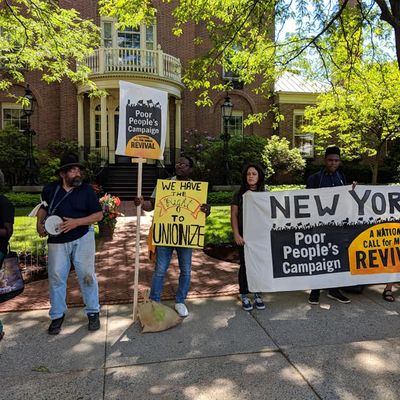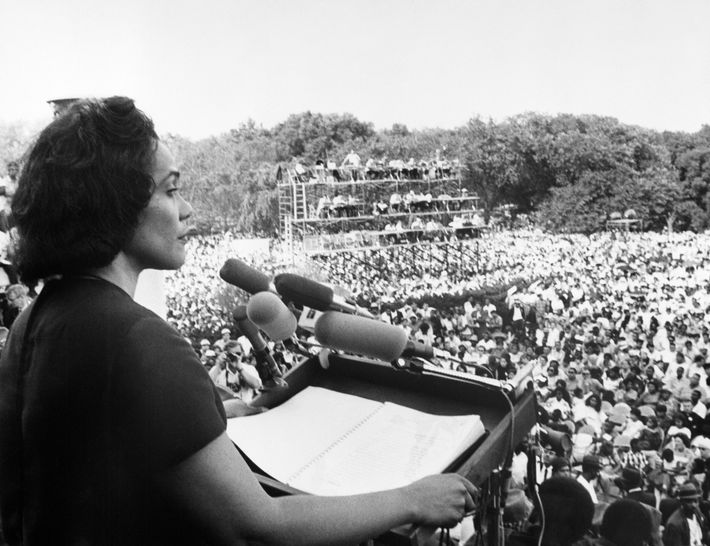
Eating turkey-and-mustard sandwiches in the First Presbyterian Church in Albany, the demonstrators of the New York State Poor People’s Campaign are learning how to get arrested.
Mark Mishler, legal counsel for the campaign and the only man in the room with a tie on, goes over strategy, best practices, and the likely charges: trespassing or disorderly conduct, neither of which are criminal. “It’s pretty intimidating,” said Mishler. “It can be upsetting, even if you’ve experienced it.” The tone he adopts is like teaching someone to dive into water from a decent height. It’s not scary — okay, it’s a little scary.
It’s the final Monday of a six-week program of civil disobedience to jump-start the new Poor People’s Campaign, marking the transition from nonviolent direct action to a second phase, fighting poverty at the state level. From Mother’s Day to Father’s Day, roughly, protesters have marched on the capitals in almost 40 states, demanding an end to systemic inequality and the stigmatization of the poor. The campaign enjoys the symmetry of a 50th anniversary: June 23 marks a half-century since the culmination of the original Poor People’s Campaign, where 3,000 protesters camped on the Washington Mall for six weeks in the name of economic justice. Launched by Martin Luther King and the Southern Christian Leadership Conference, the campaign targeted the causes of poverty that were not dampened by the civil-rights movement. The original PPC had the momentum of a decade of organizing behind it, but the new campaign is starting nearly from scratch. Hence, the buses up to Albany, the sandwiches, and the arrest lessons.
“In this campaign, more than 2,000 people have engaged in nonviolent civil disobedience,” said Reverend Liz Theoharis, a co-chair of the new Poor People’s Campaign. On June 11, she and co-founder Reverend William Barber II were arrested and detained for 26 hours at the Supreme Court after the 5–4 decision to allow Ohio to purge inactive voters from the rolls. She was also arrested the week before in Lansing, Michigan, as part of the six-week campaign of demonstrations. “It’s such an emergency we’re willing to put ourselves out there and go to jail and keep on coming back.” Already, it’s paying off. Though there’s no legislation to support at the moment, the PPC has caught the attention of politicians working to widen the social safety net. On June 12, Elizabeth Warren, Bernie Sanders, and Maryland representative Elijah Cummings hosted a forum on poverty with Reverend William Barber and the PPC on Capitol Hill; two days later, five Democratic reps read testimonials from the campaign on the House floor.
There are many returning faces among demonstrators in Albany; most of the 100-or-so preachers, activists, and mobilized poor sharing their stories have attended at least one of the protests in the last six weeks. “I didn’t learn that schools were falling apart from the news,” says Juan Peralta, an organizer at the Justice Center en El Barrio in Harlem. “I learned that schools were falling apart going to a school that was falling apart.” Claudia de la Cruz, an ordained minister and social worker from the Bronx, joined the campaign two years ago during its “reality tour,” a road trip assessment of America to determine the focus of the PPC. De la Cruz grew up poor in the South Bronx, despite a father who worked multiple jobs and a mother with a master’s degree. “I remember, people around me both in church and in school understood poverty as a personal deficiency,” she says. “But through experience and study I have learned that poverty is convenient to the small group who exploits the majority for profit. It didn’t really matter if my dad would have gotten that third gig, or if my mom would have taken on summer classes to get a little bit of cash, they were never going to accumulate — not even at the smallest scale — the wealth that only a handful of people have in this country.”
The mandate of the Poor People’s Campaign is broad — reflective of the bounty of challenges that the 41 million Americans under the poverty line face on a daily basis. The PPC demands access to clean water; an end to mass incarceration; health care as a human right; the re-expansion of voter protection laws; immigration policies that protect families; a cut in military spending to pay for it all; and an expansion of the definition of poverty that takes into account the cost of living. The agenda of the PPC is a moral one, and they seek to reclaim the language of the religious imperative from the white, conservative Evangelical. Throughout the day, pastors in Albany lamented the Justice Department’s use of the Bible to justify the forced separation of migrant families who cross the border without U.S. citizenship. “It’s suspicious that Jeff Sessions cites Romans 13, an excerpt that was used to defend slavery,” says Rev. Dr. Amaury Tanon-Sañóntos, a capital-district pastor originally from Puerto Rico. “But he stopped right before it says ‘Love does no harm to a neighbor.’”
Most of the current demands were drawn from Martin Luther King’s original framework for the Poor People’s Campaign in December of 1967. In the face of “a kind of social insanity which could lead to national ruin,” King laid out his groundwork for the eradication of poverty, including a guaranteed annual wage, and the construction of 500,000 low-income housing units per year, backed by a $30 billion package as legislative muscle. But four months to the day after the PPC rollout, he was assassinated in Memphis, where he was supporting a strike by black sanitation workers after two men had been crushed to death in the back of a garbage truck while hiding from the rain.

The Poor People’s Campaign was MLK’s pivot “from the era of civil rights to an era of human rights,” and was prescient in anticipating the sharp rise of inequality over the past 50 years. As the economy has soared, real wages have remained stagnant, with 64 million people working for less than $15 an hour. Rent has gone up faster than income in most American cities; as of 2016, there was no state in the nation in which an employee earning the $7.25-an-hour federal minimum could afford a two-bedroom apartment. The racial wealth gap looks like a decimal error: for every $100 in wealth among white families, black households have only five dollars and four cents. “When King put forth his vision, he assumed he would be there,” says Al McSurely, a civil-rights lawyer and a veteran of the original PPC who spoke over the phone from North Carolina. “The Poor People’s Campaign has got to have an asterisk on it. The vision was destroyed on April 4 of 1968, when King was killed.”
Unlike the old vision — rising and falling with the fate of one extremely charismatic leader — the new PPC finds strength in its broad geographic approach, mobilizing and connecting community projects already in place in 39 states. In a way, it’s the same work, just under new management: connecting cell systems of activism to create a body that can fight poverty on the national level. Thus, the June 23 “Rally to Fight Poverty Not the Poor” on the National Mall isn’t the culmination of the six-week protest, but a breath before moving forward. In the coming months, the PPC will turn to voter registration drives, following in the vision of co-chair Reverend Barber, whose Moral Mondays initiative in North Carolina helped disrupt the GOP’s trifecta control of the state government.
In Albany, the PPC demonstrators loaded up on water and walked a few blocks through the sticky heat to the state capitol’s million-dollar staircase. After 90 minutes of song and speech, ten protesters in T-shirts reading “We’ll Be Back” sat with locked arms in front of the entrance to the senate chamber. They were arrested and removed, so protesters blocked a different entrance to the senate, starting a very slow and orchestrated cat-and-mouse game between the state police and the PPC. The process was overwhelmingly polite — one officer actually said “my bad” as he made his way through the crowd to make an arrest. As they waited to be processed, an older woman in a floppy sunhat made jokes with a beefy statey, old friends after six weeks of practice. The rest of the protesters hugged the wall of the hallways, belting protest songs as they waited for the 27 arrested to be processed and released. Due to the grand acoustics of the building — the interior is made of marble cut by prisoners at Sing Sing — their chants wandered through the halls to the exits. “A bunch of freaky hippies in there,” said a security guard, manning the metal detector on Washington Street.






























